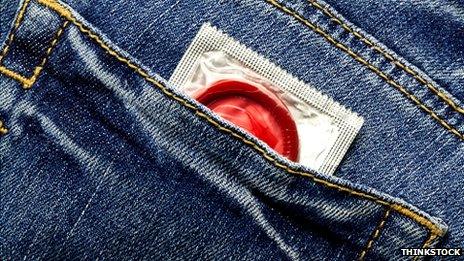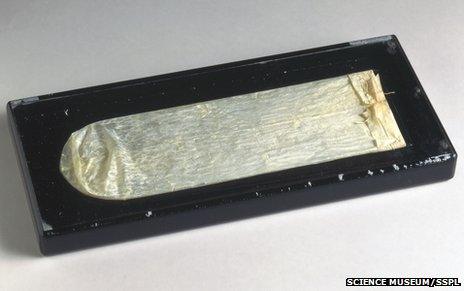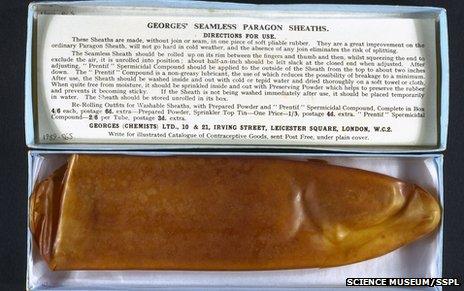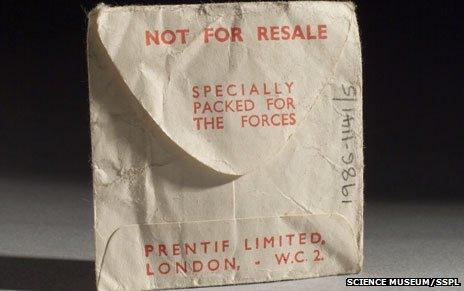Condoms: Why are we still embarrassed about using them?
- Published

A new restaurant promoting safe sex and condom use has opened in the UK, but many people are still too embarrassed to even buy them - why?
As sex education goes, it's pretty unconventional. Cabbages and Condoms is a Thai restaurant chain that serves food along with contraception. The name says it all.
Condoms are handed out to customers instead of after-dinner mints and each restaurant is covered in them - literally. Lights and walls are adorned with condoms, artworks are even made out of them.
All profits go into sex education and Aids prevention programmes in Thailand. Now it has opened its first branch outside Thailand, in the Oxfordshire town of Bicester.
Of all the towns in all the world, it's not an obvious choice.
But in the UK many people are still too embarrassed to buy condoms in public and can't even talk about sex "in a normal way", say sex education charities.
So why are so many of us still so uncomfortable when it comes to condoms?
This awkwardness is enshrined in British popular culture. Songs like House of Fun by Madness, external sum up the awkwardness many feel when trying to buy condoms, with such lines as: "A toothbrush and hairspray, plastic grin. Mrs Clay on the corner has just walked in."
Britain is a sexualised society where adult shops like Ann Summers can be found on many High Streets and condoms and lubricants of any number of flavours, textures and smells can be bought at your local chemist.
A survey by Fusion Condoms found 56% of people surveyed, were embarrassed to buy them. When it came to men, 54% got red faced while 57% of woman did.
Sexual health charities agree embarrassment is still a big issue for many people.
"We're still so British about sex and condoms, many people find it easier to have sex rather than to talk about it," says Genevieve Edwards, executive director of health improvement at the Terrence Higgins Trust.
"It's a population-wide issue, something that doesn't really change whatever sex or age. Buying condoms is a public declaration that you want sex and many people still aren't comfortable with that."
James, 48, from Surrey, is a successful businessman but still feels very awkward when buying condoms.

Figures at Cabbages and Condoms are covered with condoms
"Let's just say self-service tills have made life a lot less stressful," he says.
"I will always use them rather than dealing with a person. I think my unease is something that lingers from my youth. Back then condoms and talking about sex were not done."
The embarrassment factor has helped online retailers. The sellers range from commercial operations like Johnnys in a Jiffy to the NHS retailer Freedoms Shop.
In the four years since it was set up, myCondom.co.uk has seen sales increase month-on-month.
But customers still demand discretion. This can be for several reasons and embarrassment is one of them, says managing director Alex Green.
"A large part of the business is niche condoms," he says. "We sell a lot of small-sized condoms and it's obvious why someone might not want to buy them in a shop.
"Even online, people are still very concerned about avoiding embarrassment. We get a lot of enquiries about our packaging, some customers even ask for photos of what their order will be sent in.
"We use plain packaging because people make it very clear they don't want something advertising what's inside.
"We also get queries about what company name will appear on bank and credit card bills."
The British have a "strange range" of attitudes when it comes to condoms. It ranges from the absolute brazen to the acutely embarrassed and a lot more in between, says psychotherapist Phillip Hodson, a fellow of the British Association for Counselling and Psychotherapy.
"Buying condoms means you are having to be absolutely explicit about something many people want to be implicit about. You are having to admit you are planning to have sex or want to have it."
Talking about using condoms is also something people struggle with, again regardless of age, according to the FPA (Family Planning Association).
Its figures show 61% of people find talking about condoms with a new sexual partner a difficult conversation to have. Of those, 70% find it embarrassing and 36% say it makes them less likely to use a condom.
Health professions say the obvious way to overcome this is better sex education in schools.
While some schools are doing a good job, others aren't, and this means young people are often getting their information in the playground or on the internet.
"We all know the quality of that information," says Edwards.
Hodson says condoms are just part of what young people need to be taught.

This condom, dating from the early 19th Century, is made of animal gut and is seen here with waxed paper envelope packaging

Even after the introduction of rubber condoms, some - like this late 19th century example - were still being manufactured from caecal membrane and silk

This rubber sheath, still in its original 1940s packaging, is made of "one piece of soft pliable rubber" and is designed to be reusable

This packet of one latex condom was issued to British troops on active service during WWII, and "withstands all climates"
"They need to be at ease dealing with them, but with that they also need to be taught that sex is powerful and can be an overwhelming thing and they need to think about what they are doing. All of that needs to be taken into account.
"We also need to get to parents and teach them how to talk to their children about sex.
"We need to get across that just because their children are educated about it and how to use a condom it doesn't mean they are going to go out and have loads of sex."
He says other countries, like Holland, are able to talk to young people about sex in a natural way, "without sniggering like the British often do".
Katherine, 17, from Essex, says teenagers do talk about condoms, but nearly always in a joking way.
"I'm more likely to be hit in the head with a condom filled with water or get one taped to a birthday card than have a serious conversation about them," she says.
"Young people tend to hide behind humour and make things funny so they're not embarrassed.
"If you do need one you ask a close friend, you don't often buy them. We're given a lot of free condoms at safe sex talks. It saves embarrassment and money."
In the Fusion survey it was 16 to 19 years olds who found buying condoms the most embarrassing - 65% of those asked said they found it difficult. But so did 57% of people between the ages of 20 and 30, and 50% of those aged over 31.
It shows people of all ages need just as much support as teenagers when it comes to sexual health, says Dr Audrey Simpson of the FPA.
"The problem is that we are preoccupied with the sexual behaviour of the young and consequently thirtysomethings are a forgotten generation in sexual health," she says.
"They received little sex and relationships education at school but grew up in an increasingly sexualised society. They've had to find the confidence themselves to talk about condoms and learn the hard way.
"It's not surprising that people can feel it's easier not to use a condom than put themselves through the torture of talking about a subject they feel deeply uncomfortable about."
At least in Bicester, embarrassment apparently hasn't stopped people eating at the town's new condom-themed restaurant.